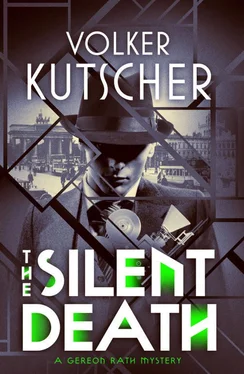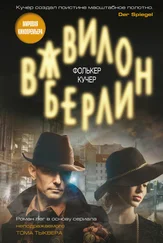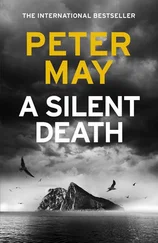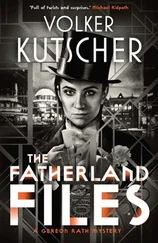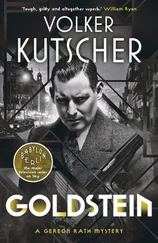‘Easier said than done. That doesn’t just depend on us – Böhm should know that by now. What does he think of our suggestion to search all disused cinemas in the city?’
‘Not much. Too costly, and above all too hasty, he says, no need to throw the cat amongst the pigeons. We shouldn’t be looking for possible links to the Franck case. On the contrary, we should be trying to locate evidence which shows there are entirely logical explanations for Fastré’s disappearance.’
Rath gave an angry shake of the head. ‘Lange, my man, I’m afraid I didn’t hear a word of that. Before we set to work on our list, I’ll telephone the search unit and ask them to find out which cinemas are no longer in use. That way, local stations can carry out the checks. That shouldn’t be too costly, should it? And if the press don’t hear of it, there won’t be any pigeons to throw the cat amongst.’
‘Böhm will kill us.’
‘Don’t worry about that. If anyone’s for the chop, it’ll be me.’
She is exhausted. It’s no use anymore. He has to end it.
How many days has she been here now? He doesn’t know.
What time is it? Morning again? Afternoon? Evening? What does it matter?
Time no longer exists; it has been banished from this room where daylight does not enter, this room which does not depend on the course of the sun.
How beautiful she is. He gives her a final jab, and she looks at him with an expression of profound gratitude. She has not only grown used to it, she positively longs for it. Soon she will be summoning her final reserves.
Since he has taken her false voice, a certain intimacy has grown between them. She has overcome the shock quicker than the first, whom he could only film on one occasion before setting free.
She has submitted completely to her fate and entrusted herself to his care, as if she knows he will grant her immortality. Even though he hasn’t spoken to her since. Not a single word. He doesn’t want to sully these silent, angel-like beings with the sound of his own imperfect voice.
He places the glass in front of her, as he has each time in the preceding hours, closes the door and takes his position behind the camera. She knows that he is watching her through the screen. She probably knows he is filming her too, even if the whirr of the camera can’t reach her. The room is soundproof.
She gazes into the black screen as if she knows he is standing behind the thick glass and yet she sees only herself, in all her perfect beauty.
He gets some wonderful scenes again, even if the exhaustion is now writ large on her face. She gazes directly into the lens, as if she knows where to look.
One of those images he will never forget, for which he needs no camera because it is forever burned into his memory, her eyes, her gaze…
Her gaze that day at the Christmas table… The way Mother places her cutlery to one side and dabs her mouth with the serviette before speaking. He ought to have known it then, the moment she asks her question, her voice warm and solicitous, her eyes ever so cold.
Richard, are you not well?
Don’t worry, darling, a little dizzy spell. You’ve only just given me a jab; I’ll be fine in a moment.
Perhaps you should go and lie down, says the warm voice beneath the cold eyes.
Certainly not…
Should I give you another jab?
Father waves her away, but soon it becomes worse. There is sweat on his forehead, he starts to speak incoherently. Before dessert, Albert and Mother carry him to the sofa in the library where it is quiet and dark. They have to support him, so weak is he suddenly, this powerful, old man with the biblical beard.
When they look in on him quarter of an hour later, he is no longer moving. Dr Schlüter is called, but the senior medical officer can only pronounce the death of his old friend. Richard Marquard, head of a vast financial empire, is dead, deceased on Christmas Eve 1925, before the exchange of gifts.
At the time he attached no significance to the glance Dr Schlüter cast his mother. He took if for sympathy, for compassion, and not for love.
He believes Mother’s tears. Because he still doesn’t know she has gone mad.
When he checks his insulin ampoules a few days later, he is surprised there are so few; he had thought he could get by for longer. But he thinks nothing of it. Dr Schlüter will get him more.
After the death of his father, the senior medical officer comes by more and more often to comfort them. Mother is grateful, but soon it becomes too much for her; all too often the doctor disrupts the togetherness of mother and son.
Her tears soon dry.
She is happy when she is alone with her son. And he is glad he can console her about the death of her husband.
Then Dr Schlüter dies too. Only a few months after Father, on the same sofa.
This time the results are clear: death from hypoglycaemia. For some years, the senior medical officer had been suffering from mild, age-related diabetes, which he treated with small doses of insulin to continue eating and drinking normally. It is inexplicable that the experienced physician should have administered himself the incorrect dose.
Once again there are insulin ampoules missing from the cupboard, and the memory of Christmas Eve returns with a vengeance. He is standing next to his dead father again, and this time sees clearly how Dr Schlüter takes the syringe and smells the hypodermic needle. Sees the brief moment of shock, of horror in the doctor’s eyes as his gaze flits to that of Mother.
He knew! The doctor knew!
And yet he covered for her.
Why?
Now he is lying there himself, dying a miserable death from too much insulin. And there are only two people who know the truth.
Mother and son.
And now? What is he to do with her? With a murderer in the house? He cannot give her up to the police; she is the only person he has left.
Why did you do it? he asks after Dr Schlüter’s funeral, when they are back alone in the house.
Because you are my son and I love you.
She smiles blissfully as she says it. At last she has her son to herself.
Father had it coming for a long time, she says. Have you forgotten how he tormented you?
And Dr Schlüter?
What do they want from me, all these men? It’s you alone that I love! Come to me, my boy! No one will torment you anymore.
You are mad. He doesn’t say anything else. Just these three words.
She smiles blissfully. My darling boy.
And when he locks her up, when she is locked up by her own son, she laughs her laugh for the first time, that unbearable squealing laugh which drowns the whole house in madness, and sits at the window and stares at the lake for hours on end.
Her gaze fixes on the screen. She seizes the glass, drinks from it ever more greedily, but it’s no good, not this time. She throws it against the wall when she realises it contains only water.
No juice, nothing sweet, not this time.
Her gaze. The recognition. The understanding. So much expression in that gaze. At that moment he feels a love for her such as he has never felt before.
It is the best film he has ever made.
No sooner had the car door clicked shut than the dog was making a fuss. Kirie reared on her hind legs, pressed her front paws against the passenger door and barked at the window, which steamed up immediately. Nor did the barking stop when Rath opened the door, only now the dog was also wagging its tail, and jumping up and down agitatedly on the leather upholstery. He could barely grab hold of her collar to put her back on the lead.
‘Looks like you’re coming with me,’ he said. ‘So behave yourself! We don’t want you peeing on a stranger’s carpet.’
Читать дальше
